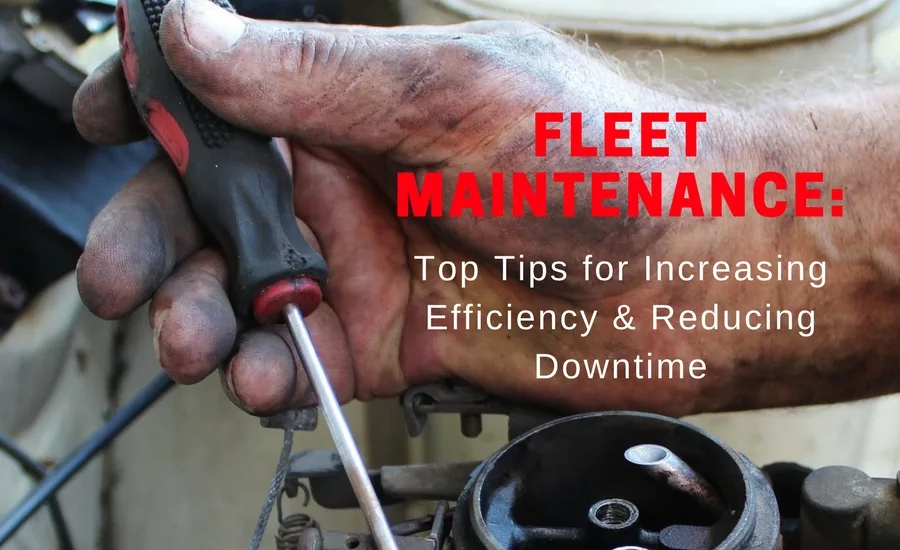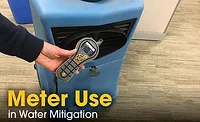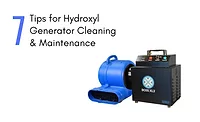Fleet Maintenance: Top Tips for Increasing Efficiency & Reducing Downtime

Your fleet of commercial trucks and vans is vital to ensuring that goods get where they need to go with minimal hiccups or (literal) roadblocks. These vehicles are constantly exposed to long hours and the stress of the road, which means developing a preventative maintenance plan is key to keeping them in good working order.
Not only that, but a good plan may help lower the costs that are often associated with operation and fuel, while continuing to boost worker productivity. And, of course, ensuring that every piece and part of a vehicle works properly helps reduce liability and keeps your drivers and others on the road safe.
There are two types of vehicle maintenance that you’ll probably come across when regularly dealing with a commercial fleet: proactive (scheduled and preventative maintenance) and reactive (unexpected breakdowns and repairs). While both are pretty much inevitable at some point or another, you can reduce the amount of reactive maintenance required when you implement a good proactive maintenance plan following these tips. Proper maintenance of commercial vehicles is one of the smartest things you can do to keep employees safe and maximize every single dollar spent on transport.
- Perform an Evaluation — The first step to developing a reliable fleet maintenance plan is to assess the status of your current fleet. Develop a checklist and report for monitoring various factors on each vehicle. Make note of leaks, tire tread, fuel levels, mileage, and other important aspects through a top-to-bottom inspection.
After you’ve implemented your maintenance plan, you’ll be able to update these reports periodically and compare them to evaluate how much maintenance and overhead should go into maintaining your commercial vehicles annually, monthly, or quarterly.
- Make a Schedule (And Stick to It) — A solid preventative maintenance plan starts with a good schedule. Every month, be sure to perform duties, such as topping off the engine oil and filters and checking vital components like the cooling system, engine and transmission mounts, fuel system, exhaust system, undercarriage, frame, and lights.
A monthly tune-up can go a long way in preventing unnecessary breakdowns that lead to downtime and disruptions in service. At the end of the day, your main goal is to make sure that the majority of fleet maintenance is scheduled rather than unscheduled.
- Lighten Up Your Load — Another good thing you can do to ensure that you’re not putting undue stress on your fleet is to make sure that you’re paying close attention to weight limits, not just so that you’re following the law, but also to increase efficiency. A lighter load can help prevent extra strain on a vehicle while simultaneously improving fuel efficiency.
But you don’t have to limit the amount of goods you’re transporting to reduce weight. Consider investing in lighter weight shipping supplies, especially plastic pallets and lighter weight plastic bulk containers that are more lightweight and durable than wood or metal.
- Ask for Reports from Drivers — Your fleet operators are your greatest resource when maintaining and diagnosing issues with commercial trucks. Not only do they know the vehicles well, but they also have personal incentive to keep them in good working order.
Have drivers implement a vehicle monitoring program where they record essential data, like wear and tear of tires and exterior components, as well as miscellaneous concerns that they might come across on the road. A good crew of drivers should be able to independently report and inspect fleet issues.
- Go Green — We’re just going to go ahead and say it: new commercial vehicles don’t require as much maintenance or fuel as their old gas-guzzling counterparts. Case in point: a Utah-based startup is working hard to introduce the world’s first eco-friendly semi-truck, and companies like DHL and Penske are quickly converting to partially green fleets. But you don’t have to scrap your entire fleet to get a cleaner-burning (and more efficient) vehicle.
Consider the use of alternative fuels and fuel-saving upgrades to make your fleet more environmentally friendly. You can also maximize fuel efficiency by switching to synthetic oil and high-capacity filters, and upgrading to a high-flow exhaust system and air filter.
- Keep a Close Eye on Tires — We don’t have to explain why tire maintenance should go at the top of your list in terms of fleet maintenance. They’re definitely the components that get the brunt of the abuse, and keeping them well-maintained equals greater safety for your drivers. In fact, issues with tires cause nearly half of all breakdowns.
So, how do you make sure that your fleet’s tires are always in good shape? It’s a good idea to ask service technicians and drivers to perform weekly tire checks, not only to check tire pressure, but also to assess treads and sidewalls. These facets can ensure that fleets are never at risk of accidents related to improper tire maintenance.
- Prepare for Seasonal Changes — Commercial vehicles don’t get to hibernate when the cold weather rolls in, which means that they should get some extra-special treatment to prepare for the winter months. Prepare your fleet for winter by topping off basic fluids — especially antifreeze, washer and hydraulic fluids — and test your fleet’s batteries to ensure that they hold a proper charge. This is also the time of year to invest in new windshield wiper blades and have heating components inspected to make sure that they’ll keep your driver safe and comfortable during snow and sleet.
- Stay Up on Recalls — As previously mentioned, a smart preventative maintenance plan should prioritize driver safety, not only for the operators of your fleet, but also for others on the road. As part of your monthly maintenance program, make sure to check regularly to make sure that there are no current safety recalls affecting any vehicles in your fleet.
This is relatively easy to address by typing in a vehicle’s VIN number into the National Highway Traffic Safety Administration’s website. It should go without saying, but make sure to immediately address any recalls.
Looking for a reprint of this article?
From high-res PDFs to custom plaques, order your copy today!







